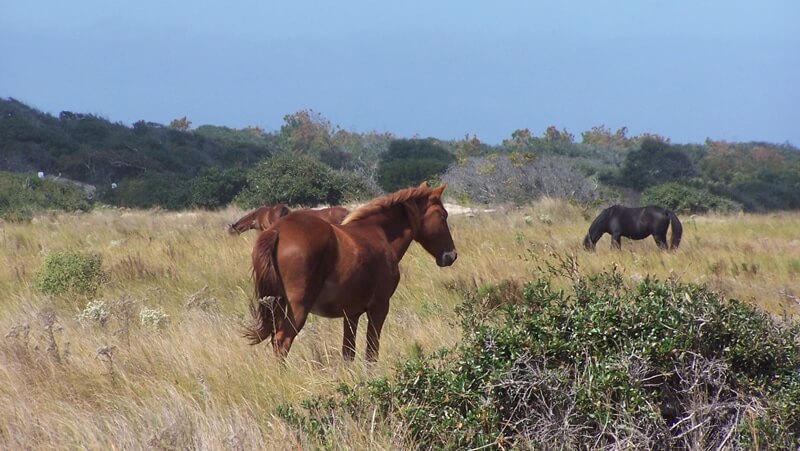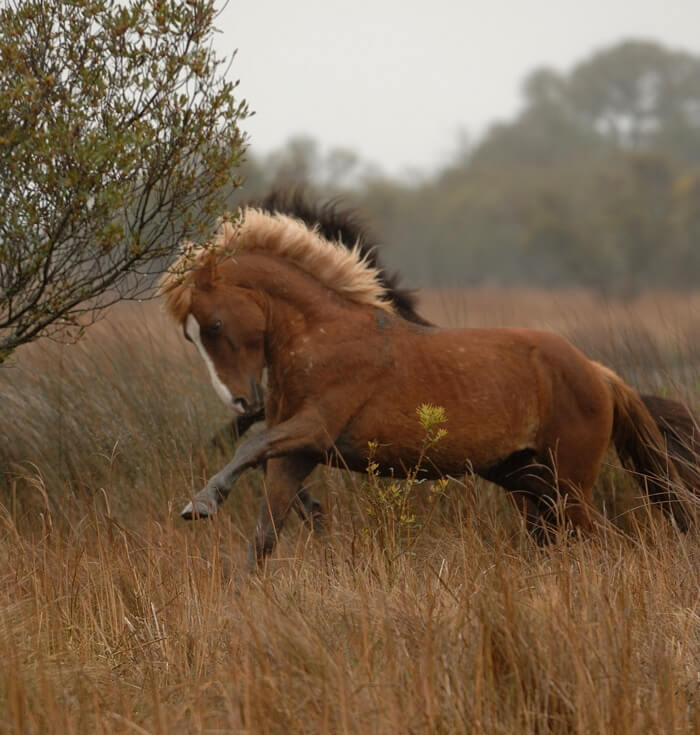Wild Horses Threatened by Development

The Wild Horses of Corolla
This summer many of us read and perhaps even signed a petition circulated by the Corolla Wild Horse Fund concerning the opposition of commercial development in the 4×4 beaches in Corolla, North Carolina. The response to the petition was overwhelming; it received over 10,000 signatures. Many of the signers made comments about saving the wild Spanish Mustangs and saving the very way of life in Swan Beach and Carova Beach.
Although the petition inspired a lot of action on the public’s part, we were curious about the reason behind the publication of the petition. Is there a history of attempts to develop the 4×4 beaches? Is this a real threat?
We went directly to the circulator of the petition, the Corolla Wild Horse Fund. This organization’s mission is to protect, conserve, and responsibly manage the herd of wild Colonial Spanish Mustangs roaming freely on the northernmost Currituck Outer Banks, and to promote the continued preservation of this land as a permanent sanctuary for horses.
The CWHF was established after at least 20 horses were killed by vehicles on the stretch of road between Duck and Corolla between 1985 and 1996. By 1997, two sound to sea fences were constructed, and the remaining horses were moved north of the paved road to the 4×4 beaches. Despite being referred to as a “sanctuary” for the horses, the land is home to over 700 houses and is a mix of 1/3 public land and 2/3 private land.

Karen McCalpin, Executive Director of the CWHF, is extremely opposed to commercial development in the 4×4 beaches. “[The horses] are already on the critically endangered, nearly extinct breed list,” she said. “So allowing commercial development in what’s left of their habitat—they have been pushed as far north as they can go—is sealing their fate.”
According to McCalpin, the petition was started by a resident of the 4×4 beaches but actively promoted by the CWHF. She says, “There is a lot of fear on the part of property owners and residents up there that the county might be interested in settling the lawsuit.”
The CWHF Facebook page linked to the petition and stated that developer Gerald Friedman would like to build a hotel, boardwalk, and 19,000 square feet of commercial buildings in the 4×4 area. The post urged readers to think of the wellbeing of the horses.
Many signers of the petition left comments alongside their names. One signer from Pittsboro, NC said, “Once you take it away it will never be replaced.” An enormous number of people stated that they would never vacation in the area again if the development occurs.
“There’s a mystique that attracts people here because it’s so rare and unusual to find that,” McCalpin said. “If you look at our lives and how our lives are so connected to work and technology, to go up there and be able to observe these magnificently beautiful horses living wild and free, it’s just incredible. People are moved by it. People come back year after year for that reason, and that’s clear reading that petition.”

McCalpin also worries that commercial development would be a strain on the resources of Carova Beach and Swan Beach. Residents pump well water for their homes, as there are not county water services in the area.
“I would be worried about my well going dry,” said McCalpin. “What people are saying is we don’t want commercial development, and we need to responsibly manage the residential development.”
The commercial development conflict began when a company named Ocean Associates, LP purchased about 1,400 acres of property in Carova Beach in 1966. The company would later sell land to four other companies and three individuals, one of which was Gerald Friedman.
The initial intent of Ocean Associates was to develop a residential subdivision and related commercial services. Currituck County had no applicable zoning ordinance at the time that would prevent this development. However, by 2004, when Ocean Associates decided to move forward with development of a convenience store, real estate offices, a post office, and a restaurant, the county had passed several zoning ordinances forbidding business uses in the area.
As a result, Ocean Associates and the other landowners entered into a legal battle with Currituck County, which has continued ever since. In their most recent amended complaint in 2013, the plaintiffs alleged that the county had taxed their property as a business property since 1969 so not allowing them to develop the property for business uses contradicts the taxation.
The two major public concerns that have arisen in opposition to the development are the survival of the wild horses and the disruption of the current way of life for residents of the 4×4 beaches.
McCalpin believes that no one who lives or owns property in the area supports the development for both reasons.
“In terms of the welfare of the horses, and not just the horses [but] all wildlife, when commercial development is allowed on the beach, they’re history,” she said. “And an animal that has managed to survive for five centuries on their own, in spite of us, will succumb. That will be the final nail in the coffin.”
McCalpin encourages those who oppose the development in the 4×4 beach to start with signing the petition, but also to contact the Currituck County Commissioners with thoughts on the matter. ♦




